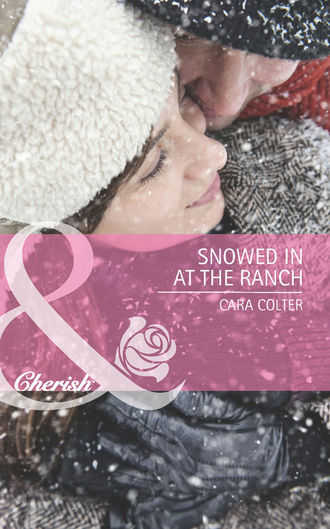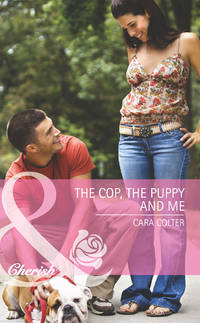
Полная версия
Snowed in at the Ranch
The baby, eyes shifting from him to his mother and back again, suddenly relaxed. “Papa,” he cooed, and leaned away from his mommy, reaching for Ty.
Ty took a defensive step backward.
There was no room in his world for such innocence or trust. All these things were as foreign to Ty as an exotic, unvisited land.
He realized he was still holding Amy Mitchell’s hand. She realized it, too, and with a deepening blush, slipped it from his.
“I can’t believe this,” she muttered. “I have GPS.”
She said that as if her faulty system or reading of it was the cause of the stain moving up her cheeks, instead of her awareness of him.
And maybe it was.
But he didn’t think so.
Still, he focused on the GPS, too, something safe in a room that suddenly seemed fraught with dangers of a kind he had never considered before.
The faith city folk put in their gadgets never failed to astound him, but aware she was still terrifyingly close to the tear stage, he tried to think of a way to phrase it that wouldn’t wound her.
“It wouldn’t be the first time GPS got people into trouble in this country,” he said after some thought.
“Really?”
Obviously, she was pleased that hers was not an isolated case of being misled by her global positioning system, and he could have left it at that.
Instead, he found the worry lines dissolving on her forehead encouraging enough to want to make them—and the possibility of tears—disappear altogether.
“One of the neighbors found an old couple stranded in George’s Pass last year. They’d been on the news. Missing for a week.”
But instead of being further reassured that her mistake was not all that uncommon, Amy looked aghast. He remembered the locked doors and saw her considering other scenarios. Disastrous possibilities flashed through her eyes as she considered what could have happened to her if she had followed her GPS instructions somewhere other than his driveway.
Which just served as a reminder that he could not really be trusted with soft things or a woman so frightened of life she locked everything all the time and was ready to defend herself with a lamp if need be.
She marshaled herself and turned away from him. She plunked the baby down on his padded rear and began to whip around the room, picking up baby things, putting them in a pile. Given the short amount of time she had been here, the pile grew to a mountain with astonishing swiftness.
“I’m terribly sorry, Mr. Halliday. We’ll go right away. I’m so embarrassed.”
If he had thought she was blushing before, that had only been a hint of the main event.
Amy Mitchell was turning a shade of red that matched some of the lights on the tree. Was that a smile tickling around the edges of his mouth? He tried to remember the last time he had smiled.
Sunshine Sketches of a Little Town had made him smile, he decided. He’d reread that a week or so ago.
No doubt his current good cheer was because his visitor was so intent on leaving. There was no need to tell her to pack her baby and get the hell out of his house. She was doing it all on her own.
“It will take me a minute to gather my things,” she said, all business and flurrying activity. “I’ll leave the groceries.”
“Groceries?”
“Oh, I stocked the fridge. I thought I was going to be living here, after all.”
“You’re not leaving the groceries,” he said.
“Oh, no, really. You didn’t have a thing in your fridge. That’s part of why I thought I was in the right place. Nothing in the fridge, no tree up, no socks on the floor.”
She had been in his bedroom.
“Really, I didn’t think anyone had lived here recently.” She shot him a look that was faintly accusing and faintly sympathetic. “It certainly didn’t look as though anyone lived here.”
“I don’t need your groceries,” he said a bit more tightly than he intended. He was so hungry, and whatever she had in the fridge would be better than the tin of stew he had planned on opening. But to admit that might invite more sympathy, and he definitely didn’t need her sympathy.
So his place looked unlived in. So it wasn’t going to be the featured house on Cozy Country Homes. So what? It was a place to hang his hat and lay his head. He didn’t need more than that.
Or at least he hadn’t felt as if he had for a long, long time. But there it was again, unwanted, uninvited emotion whispering along his spine.
Yearning. A wish he had managed to bury deep to have something that he did not have.
“I started to unpack. I’ve got some things in the bedroom,” she explained as she scurried around the room, the remnants of her embarrassment making her awkward. She dropped a baby puzzle on the floor, and the wooden pieces scattered.
He just knew she had been in there, in his bedroom. And he knew, suddenly, why it bothered him, too. That could move yearning in a whole other direction if he let it, which he wasn’t going to.
He hadn’t allowed himself feelings for a long, long time. It must be the Christmas tree, the baby, the scents, the astonishing discovery of a woman in his house, his own exhaustion, making him oddly vulnerable, making him aware of a hole a mile deep where his soul should be.
He watched Amy Mitchell, on her hands and knees, picking up the pieces of the puzzle, stuffing them into a box. Out of the corner of his eye he could see the baby roll off his rear end onto all fours.
With startling speed and unsettling determination, he crawled across the floor, making a beeline for Ty.
Ty stepped out of his way. The baby followed like a heat-seeking missile locked on target.
“Papa!” he yelled.
“Where is his papa?” he asked, deftly sidestepping the baby one more time.
CHAPTER TWO
“SO, that’s what they call the Texas two-step,” Amy said, rocking back on her heels to watch, after something in Ty’s tone had made her look up from where she was gathering the puzzle pieces.
“It’s not funny. Tell him to stop it.”
But it was funny, watching the big cowboy trying, not without desperation, to evade the determined baby. She giggled.
The cowboy glanced at her, glared, shifted away from the baby. “Don’t laugh,” he warned her.
“I’m sorry. It just looks as if you’d be completely unfazed by almost anything life threw at you. And you’re running from a baby!”
“I am not running,” he said tersely. “Call him off.”
She did laugh then. Ty glared at her, stepped away from the baby. He had waltzed around half the living room.
“Just stop and pick him up,” Amy managed to advise between snorts of laughter. “He thinks it’s a game.”
Oh, it felt good to laugh. She knew it was partly reaction to the situation she found herself in, a release from the fear she had felt when she had been startled by the big cowboy appearing in a home she’d already been busy making hers. But life had been such a serious affair for far too long.
The tall cowboy glaring at her warningly only seemed to make it more impossible to control her rising mirth.
“Now you want me to pick him up? Before you were going to hit me with a lamp if I even looked at him.”
“That was when I thought you were the intruder,” she said, wiping at her eyes. “Now I know it’s me who is the intruder. If you pick him up and cuddle him for a few seconds, he’ll lose interest.”
“Cuddle?”
“You mustn’t say that as if I’m asking you to get friendly with a rattlesnake!”
“It was the word cuddle that I took offense to!”
“A threat to your masculinity, is it?”
“I’m wet. I’m dirty.”
“You’re scared.”
He looked at her darkly, and then heaved a sigh.
“Terrified,” he admitted, and the laughter, recently tamed, burst free again. It still felt good to release the tension that had been building in her since Ty Halliday had set her world upside down by coming in the back door of the house she had been assuming was going to be all hers for the next six months.
The tiniest smile tugged at the edges of that hard mouth, and her laughter died. Nothing in her entire existence—she’d lived all over the world, gone to university, married into a well-to-do society family—had prepared her for a man like Ty Halliday.
In a world filled with illusions, the man was absolutely, one hundred per cent real. He had physical power and presence. He was as big as an oak tree, and just as solid. He had seemed to fill the room, to charge the air in it with a subtle hiss of dark sensuality. There was something about him standing there, all cowboy, that was equal parts menace and romance.
There was toughness in the chiseled angles of his dark whisker-shadowed face, something uncompromising about the set of his chin, the muscle that jerked along his jawline, the hard lack of humor around the line of his lips.
He was handsome—Amy was not sure she had ever seen eyes that color, a flinty blue sapphire—almost beyond words, but his good looks were of the untouchable variety. He wore solitude, self-reliance, as comfortably as he wore that past-his-knees, dark, dripping Australian-style riding coat that emphasized the broadness of his shoulders and the impossible length of his legs.
“If you pick him up, the chasing-papa game will be over,” she said, though suddenly she was not at all sure she wanted to see her baby in those strong arms.
She needn’t have worried. Ty Halliday was not picking up anyone’s baby. He stepped away, Jamey followed, crowing demandingly.
“At least stop and pat him on the head and say hello to him. His name is Jamey, with a Y.”
“The Y part is important?”
“Very important,” she said solemnly. It marked one of the few occasions she had stood up to her husband and her in-laws. They had wanted James. She had not. She had thought Jamey was a wonderful compromise. They had not. But for once, she had stood firm.
“Just try it,” she said encouragingly.
Ty stopped, contemplated the situation. Jamey pitched himself into the hesitation, grabbed the hem of the wet coat and pulled himself up.
“Papa.”
Looking very much as if he was reaching out to a full-grown tiger, Ty rested a reluctant hand on Jamey’s nest of red curls.
“Hey. Little fella. Jamey.”
“Papa,” Jamey crooned, leaned into the jacket without letting go, and plopped his thumb in his mouth.
“Why does he think I’m his papa, for heaven’s sake?”
“Don’t take it personally. He calls every man that.”
“Why? Where is his papa?”
Ty looked at her then, and his gaze seemed uncomfortably all-seeing.
“Are you running from something?” he asked softly.
She actually shivered from the fierce look that crossed his face. She told herself not to take it personally. He would just be one of those men with a very traditional set of values, thinking women and children—much as he disliked the latter—were in need of his extremely masculine self for protection.
Amy hated that the old-fashioned notion actually filled her with the oddest sense of comfort.
“What would make you think I’m running from something?” she hedged, because of course that was uncomfortably close to the truth.
“Less than a week before Christmas, and you’re looking for a new home?”
“It’s just the timing,” she said. “The McFinleys wanted to be in Australia by Christmas.”
He did not look convinced, but he did not look as if he cared to pursue it, either.
“Where’s his papa?” he asked again, patting Jamey—who was showing absolutely no sign of losing interest in him—with surprising gentleness, on the head.
“I’m a widow,” she said quietly. “Jamey’s father was killed in an accident three months after he was born. It’s nearly nine months ago now.”
Some shadow passed over his face and through the depths of those amazing sapphire eyes. She felt as if Ty Halliday could clearly see the broken place in her.
She could feel his awkwardness. It was obvious from his house that he was a man alone in the world, and had been for a long time. There was not a single feminine touch in this place. It was also obvious he was a man allergic to attachments. There were no pictures, no family photographs. There was no ring on his finger.
On arriving, she had thought the McFinleys had taken their personal touches down so that she could put up her own and feel more at home. But she had not even asked herself about the unlocked door, the lack of curtains, or throw rugs or little lace dollies. She had not asked herself about the dresser still filled with neatly folded clothes.
Now, feeling his eyes on her, Amy knew it was way beyond this solitary cowboy’s skill level to know what to say to her. She was touched when he tried.
“That seems to fall squarely into the life-is-unfair department,” he said gently.
She lifted her chin. “I stopped expecting life to be fair a long time ago.”
He frowned. “No, you didn’t.”
“Pardon me?”
“That sounds like something I would say. And you’re not like me.”
“And what are you like?”
“Cynical. World-weary.”
“That’s me exactly!” she protested.
A small smile teased the devastating curve of his lips. “No, it’s not,” he said. “You just wish it was. It’s evident from looking at you, you are nothing of the sort.”
“You can’t possibly know that about me on such a short acquaintance.”
“Yes, I can.”
“How?” she demanded, folding her arms over her chest, some defense against what he was seeing. No, what he thought he was seeing.
She was not the naive girl she had once been, so reliant on the approval of others, begging for love, so desperate for a place to call home that it had made her overlook things she should have seen. Amy Mitchell was on a new path now.
She was going to be fully independent. She was not going to rely on anyone else to make a home for her and her baby.
Looking after the McFinley house, venturing so far from the familiar, expanding her website, Baby Bytes, into a viable business from there, were all part of her new vision for her life.
She hated it that a complete stranger thought he could see through it.
She hated it even more that her first day of her new life was turning into something of a fiasco.
Thankfully, no one but Ty Halliday ever needed to know.
She had called her in-laws as soon as she stepped in the door to let them know she had arrived safely.
She had heard her mother-in-law’s disapproval, so like her son’s had been.
“For heaven’s sake, Amy, give up this harebrained scheme. John and I are delighted to look after you and Jamey. Delighted.”
Delighted to control and criticize her, just like their son had done. Delighted to keep her dependent on them. She shivered. Wouldn’t they love to see the predicament she was in now?
But they never had to know. In a little while she would be where she was supposed to be, none the worse for the wear, no one to question her competence.
“By the way,” she said, “before I forget, I owe you money for a phone call. My cell phone wouldn’t work here. Now, how can you know so much about me?”
“No one with a truly jaded soul would offer me money for a phone call I wouldn’t even know you made for a month. And no one truly fed up with life arrives at a new home and makes it their first priority to put up a Christmas tree,” he said.
“Oh.”
“I don’t even know where you found this stuff. The tree is obviously too big to have arrived in your shrimpy little car.”
That shrimpy little car was the first major purchase she had ever made on her own. Her mother-in-law, not aware that Baby Nap had just signed up to be a sponsor on the website, had not thought it was a sensible use of funds.
“I prefer to think of it as sporty,” Amy said proudly. The car was part of the new independent her!
“Sporty. Shrimpy. There is no way a Christmas tree arrived in the trunk of it.”
“The tree was in your basement.”
He turned and scanned her face, looking for a lie. “This tree was in my basement?”
“Along with all the decorations and lights and such.”
“No kidding.” He whistled, long and low. “Who would buy an artificial tree when there are a million real ones two steps out the back door?”
“So you usually have a real tree?” she asked.
He snorted. “We’ve never had a tree up in this house.”
“But why?” she whispered, horrified by his revelation.
He looked at her and shook his head. “You want me to believe you’re cynical when you cannot imagine a world with no Christmas tree, a world without fluffy white kittens, a world without fresh baked chocolate chip cookies?”
“Is it for religious reasons?” she asked solemnly.
He threw back his head and laughed then, but it was not a nice laugh.
“Religion is as foreign to this house as Christmas trees. And now, Miss Cynical, you look like you took a wrong turn and ended up in the devil’s den.”
At least he had dropped the Mrs.
Amy was aware she should let it go. And couldn’t. “I just can’t believe you never had a Christmas tree. Why?”
“It wasn’t a big deal. My mom left when I was about the same age as your little guy. It was just me and my dad. Christmas was just another day, filled with hard work and the demands of the ranch.”
She felt appalled, and it must have shown on her face.
“Don’t get me wrong. The neighbors always had us for dinner.”
That did not make her feel any less appalled. “Your mom left you?” She knew she shouldn’t have asked, but she couldn’t help it. She thought of what it would take to make her leave Jamey.
And the only answer she could come up with was death.
He was irritated by her question, and it was clear he had no intention of answering her. He rolled his shoulders, and she could tell he hated that he had said anything about himself that might be construed as inviting sympathy. She offered it nonetheless.
“I guess I’m not the only one life has been unfair to,” she said softly into his silence.
He wouldn’t look at her. He shook free of Jamey, again and moved over, looked in one of the boxes. He shuffled through some old ornaments and a Christmas tree star.
And then he took his hand out and stared at it.
He was holding a packet of letters, yellow with age, tied with a blue ribbon. He swore, his voice a low, animal growl of pain.
Amy froze, stared at him wide-eyed.
“Sorry,” he muttered, and rubbed his brow with a tired hand. “Sorry.”
“What’s wrong?” she asked, and she knew instantly, from the way his expression closed, that he couldn’t bear it that she could see something was wrong.
He shoved the letters into a deep pocket on his jacket.
“I’ve just come home from a real devil of a day to find my house invaded by a lamp-wielding stranger with a baby who wants to call me Papa. What’s wrong? Why, nothing!”
“I’m sorry,” Amy said. “I really am. I’m leaving as fast as I can.”
And she meant it.
There was something about him that was so alone it made her ache. It made her want to lay her hand on the thickness of that powerful wrist and say to him, Tell me.
But if he did, if he ever confided in her, she knew instinctively it would change something irrevocably and forever.
Like her plan for a new life.
Still, looking into his closed face, she knew she was in no danger from his confidences.
He kept things to himself.
He did not lean.
He did not rely.
He was the last of a dying breed, a ruggedly independent man who was entirely self-sufficient, confident in his own strength to be enough to get him by in an unforgiving environment.
He was totally alone in the world, and he liked it that way.
She was leaving. She did not need to know one more single thing about him.
He moved to the window, away from Jamey’s relentless pursuit. He looked out and sighed.
“I don’t think life is quite done being unfair to either one of us,” he said, his voice deep, edged with gravel and gruffness.
“What do you mean?”
“Come and see for yourself.”
Amy moved beside him and was stunned to see that while she had been decorating the tree, oblivious, a storm had deepened outside the window. The snow was mounding on his driveway, like heaps of fresh whipped cream. Already the gravel road that twisted up to the house was barely discernible from the land around it.
His eyes still on the window, not looking at her, he said, “Mrs. Mitchell?”
“Amy.”
“Whatever. You won’t be going anywhere tonight.”
“Not going anywhere tonight?” Amy echoed. But she had to. She had to correct her mistake, hopefully before anyone else found out.
The urgency to do so felt as if it intensified the moment he said she wasn’t going anywhere.
If there was one thing Amy Mitchell was through with, it was being controlled. It was somebody telling her what to do. It was being treated as an inferior rather than an equal.
And she fully intended to make that clear to Mr. Ty Halliday. He wasn’t going to tell her what to do.
“I have to go,” she said.
“This isn’t the city. Going out in that isn’t quite the same as going to the corner store for a jug of milk. If you get in trouble—”
“And you think I will.”
“—and I think there’s a chance you might, it can turn deadly.”
She shivered at that.
“There’s not a lot of people out here waiting to rescue you if you go in the ditch or off the road, or get lost some more or run out of gas.”
“I’m a very good driver,” she said. “I’ve been driving in winter conditions my whole life.”
“Urban winter conditions,” he guessed, and made no effort to hide his scorn. “I don’t think that’s a chance you want to take with your baby.”
“You’re probably overstating it.”
“Why would I do that?” he asked, and his eyebrows shot up in genuine bewilderment.
Yes, why would he? He had made it plain her and Jamey’s being here was an imposition on him. The possibility startled her that he wasn’t trying to control her, that he was only being practical.
“The native people have lived in this country longer than both of us,” he continued quietly. “When they see this kind of weather, they just stop wherever they are and make the best of it. They don’t think about where they want to be or what time they should be there and who might be waiting for them. They stay in the moment and its reality and that’s why they don’t end up dead the way somebody who is married to their agenda might.”
Amy saw, reluctantly, how right he was. This was the kind of situation that had made her husband, Edwin, mental. And her in-laws. Delayed flights. Dinner late. Any wrench in their carefully laid plans sent them off the deep end.
This was her new life. If she just applied the same old rules—if she rigidly adhered to her plan—wasn’t she going to get the same old thing? Feeling uptight and harried and like she had somehow failed to be perfect?
What if instead she saw this as an opportunity to try something new, a different approach to life? What if she relaxed into what life had given her rather than trying to force it to meet her vision and expectation?
What if she acted as if she was free? What if she just made the best of whatever came?
Her desire to protest, to have her own way, suddenly seemed silly and maybe even dangerous, so she let it dissipate.
And when it was gone, she looked at Ty Halliday, standing in the window, his coat drawn around him, his handsome face remote, and she was not sure she had ever seen anyone so alone.
At any time of year, that probably would have struck her as poignant.
But at Christmas?
What did it mean that he had never put up a Christmas tree, not even when he was a child? That seemed unbearably sad to her, and intensified that sense she had of him being terribly and absolutely alone in the world.









